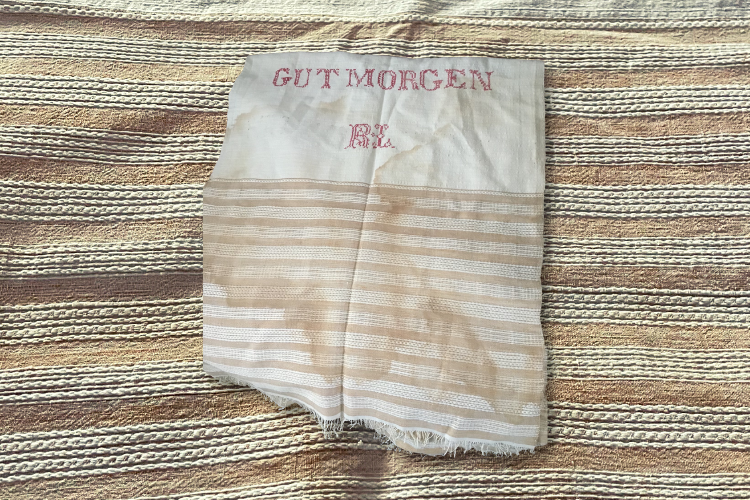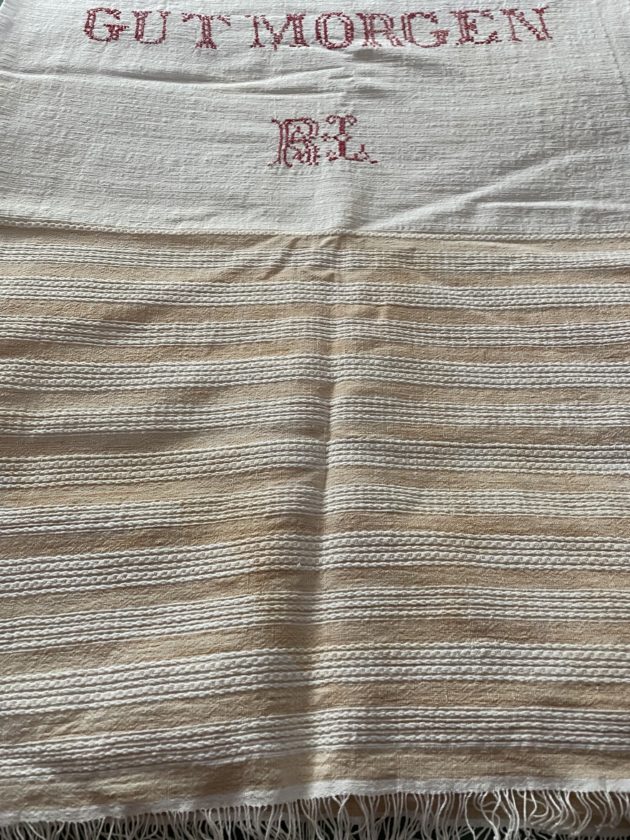
Gut Morgen, Rifka Leibowitz
I never met my Great Aunt Rifka or even saw a photograph of her. Yet I’ve always had a clear picture of her in my mind, in a wheelchair, smiling. She has no legs and she’s wearing a fur stole with fox heads.
According to my mother, Rifka always treated her kindly. Unlike all my father’s relatives who could only think of her as a “shiksa.” My Irish Catholic mom and my Jewish dad married in 1943 right before he left for training camp in Atlanta.
I recently found a letter my dad wrote to my mom’s brother after they married. An endearing letter, particularly since they ended up in a terrible divorce. The letter is fresh and upbeat. Twice he used the world swell. “Thanks for the good time you gave us and also the gift. It was swell of you. I want to thank you for the use of your car. It was swell to be able to get around to see a few of the boys.” The letter is teeming with joy, hope and innocence. Startling to me, as I was born eleven years later into a marriage marked with trauma and adultery.
Somehow in those complicated ensuing years, Rifka remained a shining star to my mother. She taught my mother to make knishes and latkes, and my mom always said, “She was a peach through and through.”
I have no information about Rifka’s later life or death, but I own a couple of her possessions. They matter to me, since I’m a collector: since high school I’ve collected vintage clothing. If anybody is cleaning out an attic, they call me. In my twenties and thirties, I was regularly decked out in vintage. For high holidays, weddings, and B’nai Mitzvot I’d go all out from head to toe. The most memorable compliment occurred while I was pouring tea at an Oneg. Two larger women walked up to me giggling, and one of them said, “We think your hat is adorable, but if either one of us wore it, we’d look like assholes.” I didn’t wear the hats after that.
After grandma died, I was allowed to rummage through her stuff and take almost anything I wanted. The dining room set, the dishes from my dad’s bris, old linens and armloads of clothes. I was in musty, but glorious heaven.
One of the items was Great Aunt Rifka’s fur stole with fox heads. The kind with the beady eyes. I wore it to the theatre a few times and once to a Thanksgiving gathering and it got some strange reactions. Years later when I procured it from a box, I found it had begun to disintegrate. Furry puffs filled the air when I lifted it up, and a foot fell off. I didn’t realize that moths had gotten to it. It took many moth infestations to understand their destructive power. Decades later, if you open my freezer, you’re likely to find a woolen item.
For me as a writer, this past year has been less than fruitful. On my desktop, there are a couple of incomplete poems, half of a short story and a completed YA novel I should be pedaling. Instead, I’ve been sorting and organizing. Partly as a war against moths ( in addition to the freezer, crushed bay leaves are the best), and also to lighten the task for my children after I’m gone.
I found embroidered linens from my grandma’s house. However, my grandma didn’t embroider. She made the best roast chicken and succulent pineapple upside-down cake, but no sewing or crafts. It’s quite possible that Rifka adorned all of the lovely items, but I knew for sure she’d made one. A heavy, linen table runner. White in the middle, tan and white stripes on the ends. The embroidery is in one-inch, red fancy letters. R.L. Underneath those initials, Gut Morgen. A breakfast cloth, perhaps.

Had Rifka privately used it to wrap herself in for morning prayers?
The cloth was covered with water stains. I soaked the whole thing in a sink full of water with baking soda, but the stains remained. A long soak in vinegar water, then dish soap. While squeezing out the water after each attempt, it occurred to me that I owed Rifka a full restoration. Wasn’t she the “peach” who my mother remained loyal to decades after her marriage disintegrated? My parents had taken a risk marrying one another in spite of their different backgrounds. I headed to the basement for the bottle of bleach.
I poured a capful on a tiny section, followed by water, dabbed, and immediately rinsed under the faucet. Going over the cloth inch by inch, it struck me that since there was fringe on the ends, the cloth resembled a tallis. Had Rifka privately used it to wrap herself in for morning prayers?
As I painstakingly made my way toward R.L. I wondered how old the cloth could be. R.L. stood for Rifka Leibowitz. Unless she’d married someone with a last name starting with L, she had created this as a single woman. Maybe in Romania a hundred years before. I held my breath, expecting it to fall apart. But I kept at it because it appeared to be holding up and not changing, reminding me of how my mother had described Rifka’s spirit: staying the same even after losing her legs.
I continued on, driven by a fierce loyalty to a woman I’d never met. My mother always maintained her devotion to my father’s aunt, even though joy, hope and innocence were drained from her marriage.
I’ll continue to place vintage hats in the freezer and treasure family linens and I’ll hold in my heart the people in my life who have inspired risk-taking, loyalty and perseverance. And now, I’ve begun a practice each morning of adding Modeh Ani to my usual yoga posture. Perhaps I should try wrapping myself in the Gut Morgen cloth when I do that: I’m willing to try anything that can restore hope, joy and innocence at this challenging time.



